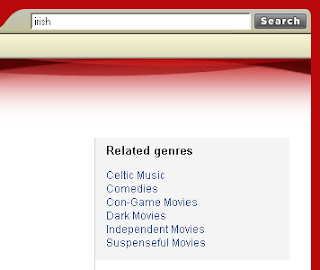
Searching for French we get Homework Help and Language Instruction and Romantic Movies (standard issue Parisian bias there on the last one, no?). But we also get Sexual-Awakening Movies (why does this get a hyphen?), Steamy Movies, and Revenge Movies. Revenge Movies?
Ok, let's try another language:

Relatively commonly learned language, so we still get Homework and Instruction. And Romantic. Fair enough. But now we also get Dark Movies, Spy Movies, Suspenseful Movies, and Visually-striking Movies (Are they not allowed to have more than two separate words in their database?) Are German movies more often visually striking than their French counterparts?
English:

Apparently English movies (or movies with the word English in the title, of course) are more likely Feel-good, Goofy, Heartfelt, or feature Mistaken-Identity or a Strong Female Lead. Really? Is this just the ocean of movies about female royalty? And I thought I was on to something about the reason for hyphenation until we hit "Movies Featuring a Strong Female Lead"
Irish? (Sorry, couldn't help it...):

So much for the language learning aspect now, but we have the relatively upbeat Comedies, Con-Game, and Music, but the rest of it is Dark, Independent, or Suspenseful. And nixy nixy on the romance and steaminess.
And apparently Japanese movies are understated and may involve wilderness survival.


3 comments:
Yes, English requires a hyphen in triple-compound nouns (or in any compound noun with more than two nouns in it) in order to communicate which two of the three go together. You can omit the hyphen only when the compound noun is widely established in English, such as "Oscar award night" or "income tax deduction."
I happen to be especially aware of this because it's a useful retort to German students who think it's ridiculous that German has compound nouns like Unterseeboot. In fact English is far more ridiculous about making long, complicated compound nouns - English simply hides them by inserting spaces between each part, which actually makes them harder to read than German compound nouns, requiring things like hyphens to help the reader figure out what on earth is meant by this long string of nouns.
And yes, the category suggestions totally confirm age-old stereotypes about French vs. German vs. Irish culture. You could make similar generalizations about about 17/18th-century French vs. German vs. Irish dramas.
i like it.
Post a Comment